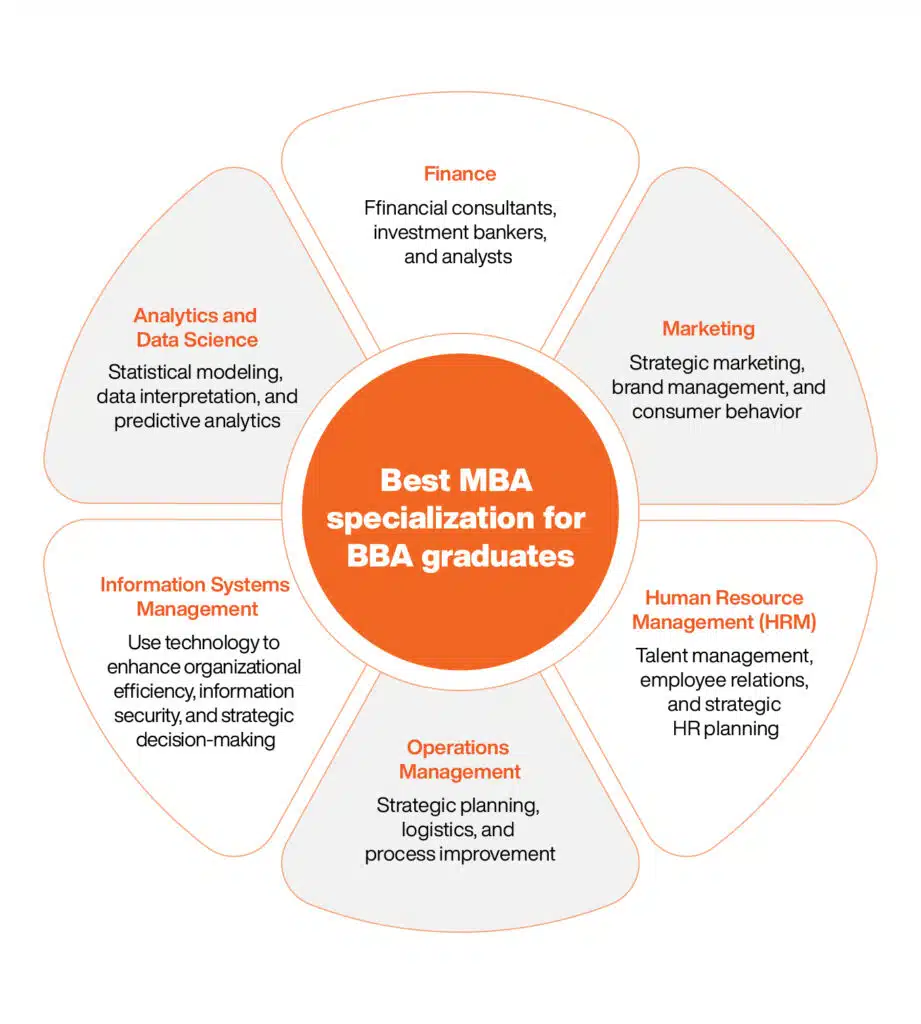A BBA degree is considered significant in today’s highly competitive job market. Yet, to be successful and shine within the competitive business realm, one has to dig deeper into the areas of professional expertise. Opting for higher education not only helps you build state-of-the-art skills but also helps you gain an educated insight into your preferred specialization.
In this article, we will look at the various postgraduate courses and career options you can choose from after attaining your BBA degree to help you advance your knowledge and skills and succeed in your chosen field.
What is BBA
BBA, or Bachelor of Business Administration, is an undergraduate program that students pursue to gain a solid understanding of business management or to become entrepreneurs. This degree can help in kick starting their career in diverse industries such as finance, marketing, sales, HRM, education and so on.
Most universities conduct an entrance exam through which students can qualify and secure a merit seat. Some commonly conducted exams are the Symbiosis Entrance Test (SET), DU JAT, IPU CET, and other state-level exams. Since the students who pursue this online degree aim to move into managerial roles, it focuses on improving communication and critical thinking, and leadership skills.
Eligibility for BBA
Eligibility for the BBA is that the student should have passed class 12 with a minimum of 50% from a recognized board. It is a 3–4-year undergraduate program. The curriculum includes Marketing, Finance, HR, Operations, and Entrepreneurship, among other courses. Students can opt for full-time, part-time, or online courses.
The course is 120-130 credits, depending on the university the student chooses. Since it offers a wide range of subjects, students prefer completing their UG with a BBA degree, as it offers practical knowledge relevant to current and evolving industry trends.
What should you do after BBA?
After a BBA graduation, students find themselves on a critical path in their professional and academic lives. For those who want to jump straight into practice, seeking employment after graduating from BBA is an option. However, it is important to point out that a BBA is often used as the starting point in the current competitive job market, and further education can be the foundation of major career progression.
Choosing to continue your studies after BBA is a rational decision because such decisions give rise to many benefits that can make it possible to grow personally and professionally. Bachelors in specialty areas provide deep knowledge about particular domains and sharpen soft skills. These skills can then be foundations of critical thinking, problem-solving, and leadership competencies—all necessary in the workplace.
Also read: Marketing vs Supply Chain Management: Which is a better career option
Top 10 PG courses to do after your BBA
Perhaps the most frequently asked question after you choose BBA as your degree course is, “After BBA, which course is best?” If you are looking to expand your knowledge and develop better expertise in business studies, then the following 10 courses are ideal to enroll in.
1. Masters in Business Administration (MBA)
One of the most popular post-BBA offerings, an MBA provides a very general and widely marketable postgraduate experience, preparing individuals for leadership positions in diverse sectors and specializations like banking, finance, sales, marketing, or human resources. Along with expertise in your chosen management specialization, you will also learn pivotal features such as team leadership, employee engagement, project management, and strategic planning.
2. Post Graduate Diploma in Management (PGDM)
A PGDM program is tailored to help you gain employment in administrative roles. Covering a broad pool of management topics, including finance, marketing, human resources, and operations, these courses provide a detailed understanding of business dynamics, helping you build versatile managerial skills.
3. Company Secretary (CS)
If you wish to gain expertise in corporate governance rather than management, opting for a CS course can be optimal. A Company Secretary plays a pivotal role in corporate governance by handling legal decisions, tax records, and financial aspects.
4. Post Graduate Diploma in Banking
This specialized program is designed to equip students with the skills necessary for banking jobs, particularly in the field of money management and investment. Perfect for those passionate about finance, these programs leave you ready to tackle tasks related to banking, risk management, financial analytics, and regulatory aspects. In short, they provide the best grounding for a successful financial career.
5. Masters in Hotel Management
Geared towards those aspiring to enter the hotel industry, this program offers short-term and long-term courses specializing in culinary administration and the travel industry. You can gain a nuanced understanding of hotel operations and customer service and even choose specialized tracks based on your interests, preparing you for dynamic roles in the hospitality sector.
6. Masters in Marketing Management
With marketing bound to stay relevant regardless of the day or age, higher education in marketing is sure to open up unprecedented career opportunities for you. In addition to preparing you for competencies in the aspect of marketing, these courses can also prepare you for leadership roles geared towards the marketing domain.
7. Masters in International Business (MIB)
Geared towards preparing individuals for global trade, the MIB program equips students with skills crucial for navigating international business environments. You can understand cross-cultural nuances, international marketing strategies, and the complexities of global finance.
8. Masters in Public Administration (MPA)
MPA programs are for those aspiring to get public service and administration jobs within government and non-profit organizations. You can develop skills in public policy analysis, financial management, organizational leadership, and governance.
9. Masters in Human Resource Management (MHRM)
MHRM programs help you develop specific human resource management skills, such as recruitment, training, employee relations, and strategic HR planning. Since HRM forms an important part of any company regardless of the domain or industry, this can be a very lucrative option.
10. Masters in Retail Management
Designed for those looking to enter the retail industry, this program provides individuals with skills tailored to the ever-changing retail landscape. You can gain a comprehensive grasp of retail marketing, supply chain management, customer relations, and store operations, making this a valid option for retail entrepreneurs.
Also read: MBA in Banking & Financial Services vs. MBA in Finance
What is the Best MBA Specialization for BBA Graduates?
After a BBA, an Online MBA degree program is naturally what many graduates opt for. This is because, being one of the most popular PG courses, it allows students to customize their education to fit their unique interests and professional objectives. So, for BBA grads, here are the top MBA specializations after BBA.
- Finance: Ideal for graduates interested in financial markets, investments, and strategic financial management. This opens career opportunities for financial analysts, investment bankers, and financial consultants.
- Marketing: Curated for the creative ones who wish to enter advertising and marketing. This specialization delves deep into strategic marketing, brand management, and consumer behavior.
- Human Resource Management (HRM): HRM focuses on talent management, employee relations, and strategic HR planning, preparing individuals for roles like HR manager or talent acquisition specialist.
- Operations Management: Ideal for graduates with a knack for optimizing processes and supply chain efficiency. Operations Management specialization teaches you concepts like strategic planning, logistics, and process improvement.
- Information Systems Management: This specialization is tailored for BBA graduates intrigued by the integration of technology in business processes. This specialization leverages technology to enhance organizational efficiency, information security, and strategic decision-making.
- Analytics and Data Science: If you have a knack for data analysis and a desire to make informed business decisions, this is your specialization. It delves into statistical modeling, data interpretation, and predictive analytics.

Top Career Options After BBA
While higher education enhances your portfolio, even BBA graduates have many opportunities they can go for. So, here are the top career opportunities after BBA, with multiple job roles you can consider in each industry.
- Banking and finance
- Financial Analyst: Analyzing financial data, preparing reports, and providing insights for investment decisions.
- Credit Analyst: Assessing the creditworthiness of individuals and organizations for loan approvals.
- Investment Banker: Managing financial portfolios, mergers, acquisitions, and capital raising for clients.
- Personal Financial Advisor: Providing guidance on investments, savings, and financial planning for individuals.
- Risk Analyst: Identifying and mitigating potential risks associated with financial transactions.
- Marketing and advertising
- Marketing Coordinator: Assisting in the development and execution of marketing campaigns.
- Brand Manager: Overseeing the brand strategy, positioning, and marketing activities.
- Digital Marketing Specialist: Implementing online marketing strategies, including SEO, social media, and content marketing.
- Market Research Analyst: Collecting and analyzing data to understand market trends and consumer behavior.
- Advertising Account Executive: Managing client relationships and coordinating advertising campaigns.
- Human Resources (HR)
- HR Generalist: Handling various HR functions, including recruitment, employee relations, and performance management.
- Talent Acquisition Specialist: Focusing on recruiting and onboarding new talent for the organization.
- Training and Development Coordinator: Planning and implementing training programs for employee skill development.
- Compensation and Benefits Analyst: Managing employee compensation, benefits, and reward programs.
- HR Consultant: Providing strategic HR advice and solutions to organizations.
- Operations and supply chain management
- Operations Manager: Overseeing day-to-day business operations and ensuring efficiency.
- Supply Chain Analyst: Managing the end-to-end supply chain process for optimized logistics.
- Quality Control Supervisor: Monitoring and maintaining product quality standards.
- Inventory Manager: Optimizing inventory levels and managing stock for efficient operations.
- Logistics Coordinator: Coordinating the movement of goods, transportation, and distribution.
- Information Technology (IT) management
- IT Project Manager: Planning, executing, and overseeing IT projects from initiation to completion.
- IT Consultant: Providing expert advice on technology solutions and implementation.
- Systems Analyst: Analyzing and designing information systems to meet business needs.
- Network Administrator: Managing and maintaining an organization’s computer networks.
- IT Security Analyst: Ensuring the security of information systems and data.
Career Options After BBA in India vs Abroad
| Category | Career Options in India | Career Options Abroad |
|---|---|---|
| Higher Education | – MBA (India) – PGDM – M.Com – Law (LLB) | – MBA (USA, UK, Canada) – MS in Management/Finance/Marketing – MIM (Europe) |
| Government Jobs | – UPSC (IAS, IPS, etc.) – SSC, Banking Exams – State PSCs | – Civil Services (country-specific, limited to citizens or PR holders) |
| Private Sector Jobs | – Business Development Executive – Marketing Analyst – HR Executive – Sales | – Management Trainee – Business Analyst – Marketing Associate – Operations |
| Entrepreneurship | – Start your own business – MSME sector support in India | – Startup support (funding, incubators in USA, UK, Canada, etc.) |
| Finance Sector | – Investment Banking Analyst – Financial Advisor – Accounts Executive | – Financial Analyst – Credit Analyst – Risk Analyst |
| Certifications | – CFA (India) – CA – Digital Marketing, Excel, Tally | – CFA (Global) – CPA (USA) – CIMA (UK) – Google & HubSpot Certifications |
| Earning Potential | ₹3 – ₹6 LPA (Entry-Level) | $40,000 – $60,000 per annum (Entry-Level; varies by country) |
| Popular Industries | – Banking, FMCG, IT, Startups, EdTech | – Consulting, Tech, Finance, Hospitality, Retail |
| Long-Term Scope | – Promotions via experience or MBA – Civil services opportunities | – Global mobility – Better salaries – High career growth potential |
Skills to Build a Successful Career After BBA
- Communication Skills – This is a very important skill as it helps to express the thought process and ideas thoroughly that can be either verbally or in writing.
- Analytical Thinking – With strong analytical skills, complicated problems can be broken down and help organizations to deduce data-driven decisions.
- Leadership – Competent leadership involves influencing, motivating and being able to steer the team in the right direction so that the end goals can be achieved.
- Time Management – Managing time efficiently allows you to prioritize tasks, meet deadlines, and increase productivity in fast-paced work environments.
- Financial Literacy – A good grasp of financial principles such as budgeting, financial analysis, and accounting is key to making sound business decisions.
- Teamwork – Collaborating well with others and contributing to group success is a crucial skill in any corporate or project-based role.
- Presentation Skills – Being able to create and deliver impactful presentations helps in communicating ideas clearly to clients, stakeholders, or management.
- CRM Software Knowledge – Familiarity with customer relationship management tools like Salesforce improves customer handling and sales process efficiency.
- Adaptability – The ability to quickly adjust to new roles, technologies, and business environments is critical in a constantly evolving global market.
Why Choose an Online PG Course from Manipal University Jaipur?
While higher education is necessary for career progression, visiting the institution for every class can seem like a hassle. However, with online PG courses through Online Manipal, you can enhance your skills remotely.
- Fast-tracked career progression: Courses are designed to deliver advanced knowledge and skills, positioning you for rapid progression in your chosen field.
- Career-oriented skills: Lessons focus on practical, career-oriented skills, ensuring that you are well-prepared for the challenges and opportunities in the professional world.
- Robust alumni network: You can access a supportive alumni network that connects you with professionals, offering valuable networking opportunities with diverse peers and MUJ alumni.
- Fully online experience: The flexibility and convenience of a fully online learning experience by highly qualified and experienced faculty allow you to balance your studies with professional and personal commitments.
- Avail easy financing options: Easy financing options make pursuing your postgraduate studies financially feasible.
- Get attractive scholarships: Various scholarships for students exhibiting academic excellence, making your higher education more affordable and rewarding.
Also Read, What is the best career move after a BBA, job or MBA?
Conclusion
If you are asking yourself, “what to do after BBA?” then choosing to pursue higher education after earning a BBA offers a transforming opportunity that can help improve your specs in the job market. A strategic investment in one’s future, an online BBA degree provides a competitive advantage, more opportunities for professional advancement, and the ability to succeed in a changing and dynamic corporate environment. When coupled with the adaptability of online postgraduate courses from MUJ, it further supports the notion that education may be effectively incorporated into one’s job path to advance knowledge and opportunities for advancement.
FAQ
1. What are some top career options to do after BBA?
Some career options include:
- Business Development Executive
- Marketing Executive/Analyst
- Human Resource Executive
- Financial Analyst
- Operations Manager
2. What are some higher education options to do after BBA?
Some most preferred career options include:
- MBA (Master of Business Administration)
- MIM (Master in Management)
- PGDM (Post Graduate Diploma in Management)
- LLB
- Masters in Finance/Economics/Marketing
3. What is a BBA degree?
A Bachelor of Business Administration (BBA) is a three-year UG program that focuses on providing students with basic knowledge of business and management fundamentals.
4. Will I get government jobs after BBA?
Yes, most of the candidates who are interested in working for the public sector can attend government exams like UPSC, SSO and so on.
5. What are some good certification courses to complement a BBA degree?
Certifications in digital marketing, data analytics, financial modeling, project management (PMP), and HR (SHRM) are beneficial.
Become future-ready with our online BBA program










